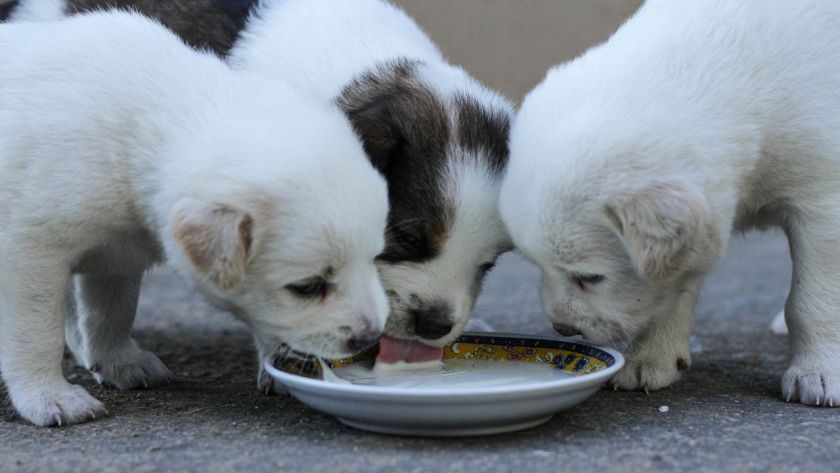Milk is a natural and nutritious drink for humans, but can dogs have milk too? Many pet owners often find their dogs gazing at them while they enjoy a glass of milk. This raises an important question: is milk safe for dogs or not?
Can Dogs Have Milk?
Yes, dogs can drink milk but only in small amounts and not all dogs tolerate it well.
- Many adult dogs are lactose intolerant.
- Even dogs that enjoy milk may face digestion issues.
- Milk is not toxic to dogs, but it can upset their stomach.
The key is moderation and observation.
Also read: Can Dogs Eat Mushrooms?

Is Milk Safe for Dogs?
The short answer is: sometimes. Dogs can drink milk, but it depends on their ability to digest lactose. Some dogs are lactose intolerant, just like some humans. This means their bodies don’t produce enough lactase enzyme to break down lactose, a sugar found in milk.
Is Milk Safe for Puppies?
Puppies drink milk from their mothers in early life, but this doesn’t mean cow’s milk is safe for them.
- Cow’s milk lacks vital nutrients that mother’s milk provides.
- Giving cow’s milk to a puppy may cause diarrhea and gas.
- Puppy-specific milk replacers are safer alternatives.
If you’re hand-raising a pup, use vet-recommended puppy formula.
Common Health Risks of Giving Milk to Dogs
Though milk is not poisonous to dogs, it may lead to several health issues:
- Vomiting or diarrhea due to lactose intolerance
- Bloating, gas, or abdominal discomfort
- Risk of obesity if given frequently
- Skin allergies in some sensitive breeds
High-fat milk may also cause pancreatitis in dogs over time.
Signs of Lactose Intolerance in Dogs
Lactose intolerance is common in adult dogs. Symptoms may appear shortly after consuming milk.
- Loose stool or diarrhea
- Frequent gas or flatulence
- Nausea or vomiting
- Excessive scratching or ear infections (in allergic cases)
- Loss of appetite
If you see any of these signs, discontinue milk immediately.
Also read: My Dog Ate Mushrooms in the Grass – What Should I Do?

What Types of Milk Are Safe for Dogs?
While plain cow’s milk is not ideal, some milk varieties are safer in small quantities:
- Goat’s Milk: Easier to digest, less lactose
- Lactose-Free Milk: Designed to be dog-friendly
- Oat Milk (unsweetened): Low in allergens
- Coconut Milk: Use very sparingly due to high fat
- Almond Milk (unsweetened): Not toxic, but avoid too much
Avoid flavored milk, chocolate milk, or sweetened milk.
Healthy Alternatives to Milk for Dogs
You can offer other nutritious drinks or treats instead of milk:
- Fresh Water: Always the best drink for dogs
- Bone Broth: Rich in collagen, supports joints
- Dog-safe Herbal Teas: Chamomile or ginger for upset stomach
- Plain Greek Yogurt: In small amounts, probiotic benefits
- Kefir (Unsweetened): Great for gut health if tolerated
Can Puppies Have Milk?
Puppies get all the nutrition they need from their mother’s milk. After weaning, they do not require milk. Giving them regular cow’s milk may upset their stomach.
How Much Milk Can a Dog Drink?
Milk should only be an occasional treat.
- Small dogs: 1–2 tablespoons once a week
- Medium dogs: Up to ¼ cup once a week
- Large dogs: ½ cup once a week
Always monitor your dog after trying milk.
What to Do If Your Dog Drinks Too Much Milk

If your dog drank a large amount of milk:
- Do not panic
- Offer fresh water to dilute digestion
- Watch for signs of discomfort or diarrhea
- Avoid feeding anything else for a few hours
- Call your vet if symptoms persist or worsen
Mild symptoms often pass in 12–24 hours.
Also read: Can Dogs Eat Celery?
FAQs: Can Dogs Have Milk?
Q. Can dogs drink milk every day?
No, daily milk can cause digestive problems in most dogs. Offer it occasionally in small quantities.
Q. What kind of milk is safest for dogs?
Lactose-free milk or goat’s milk is generally safer than cow’s milk. Always choose unsweetened and unflavored varieties.
Q. Can puppies drink cow’s milk?
No, puppies should not drink cow’s milk. Use specially formulated puppy milk replacer if necessary.
Q. Are dogs allergic to milk?
Some dogs may have dairy allergies or lactose intolerance, which can lead to vomiting, itching, or diarrhea.
Q. Is yogurt safer than milk for dogs?
Plain Greek yogurt in moderation is better tolerated by many dogs due to probiotics and lower lactose content.
Q. What should I do if my dog drinks a full bowl of milk?
Observe them closely. Provide water and consult a vet if symptoms like vomiting or diarrhea occur.
Q. Why is owning a dog so hard?
Owning a dog takes time, money, energy, and emotional investment. Not everyone is equipped for this level of care.
Q. Should I get a dog if I work full-time?
Only if you can arrange proper care during work hours. Dogs need companionship and should not be left alone all day.
Q. Can I give almond milk to my dog?
Yes, in small amounts, but only if it’s unsweetened and does not contain xylitol, which is toxic to dogs.
Q. Is milk poisonous to dogs?
No, milk is not poisonous but may cause digestive issues due to lactose.
Conclusion
So, can dogs have milk? Technically yes, but it’s not always the best choice. While a few licks here and there are fine, most adult dogs don’t tolerate lactose well. If you want to treat your dog, choose safer alternatives like bone broth or lactose-free milk.
At the same time, owning a dog is a life-altering decision. If you’re not ready for the responsibility, it’s better not to keep one. Dogs deserve commitment, love, and proper care for their entire lives.

